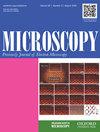Effect of nitrogen-containing bisphosphonates on osteoclasts and osteoclastogenesis: an ultrastructural study
IF 1.8
4区 工程技术
引用次数: 4
Abstract
We have previously indicated that a single injection of alendronate, one of the nitrogen-containing bisphosphonates (NBPs), affects murine hematopoietic processes, such as the shift of erythropoiesis from bone marrow (BM) to spleen, disappearance of BM-resident macrophages, the increase of granulopoiesis in BM and an increase in the number of osteoclasts. NBPs induce apoptosis and the formation of giant osteoclasts in vitro and/or in patients undergoing long-term NBP treatment. Therefore, the time-kinetic effect of NBPs on osteoclasts needs to be clarified. In this study, we examined the effect of alendronate on mouse osteoclasts and osteoclastogenesis. One day after the treatment, osteoclasts lost the clear zone and ruffled borders, and the cell size decreased. After 2 days, the cytoplasm of osteoclasts became electron dense and the nuclei became pyknotic. Some of the cells had fragmented nuclei. After 4 days, osteoclasts had euchromatic nuclei attached to the bone surface. Osteoclasts had no clear zones or ruffled borders. After 7 days, osteoclasts formed giant osteoclasts via the fusion of multinuclear and mononuclear osteoclasts. These results indicate that NBPs affect osteoclasts and osteoclastogenesis via two different mechanisms.含氮双磷酸盐对破骨细胞和破骨细胞生成的影响:超微结构研究
我们之前已经表明,单次注射阿仑膦酸盐,一种含氮的二磷酸盐(NBPs),会影响小鼠的造血过程,如红细胞生成从骨髓(BM)转移到脾脏,骨髓固有巨噬细胞消失,骨髓中粒细胞增多和破骨细胞数量增加。NBP在体外和/或在接受长期NBP治疗的患者中诱导细胞凋亡和巨大破骨细胞的形成。因此,NBPs对破骨细胞的时间动力学效应需要澄清。在本研究中,我们检测了阿仑膦酸盐对小鼠破骨细胞和破骨细胞生成的影响。治疗一天后,破骨细胞失去了清晰的区域和褶皱的边界,细胞大小减小。2天后,破骨细胞的细胞质变得电子致密,细胞核变得致密。一些细胞的细胞核碎裂。4天后,破骨细胞具有附着在骨表面的常染色细胞核。破骨细胞没有清晰的区域或褶皱的边界。7天后,破骨细胞通过多核和单核破骨细胞的融合形成巨大的破骨细胞。这些结果表明NBPs通过两种不同的机制影响破骨细胞和破骨细胞生成。
本文章由计算机程序翻译,如有差异,请以英文原文为准。
求助全文
约1分钟内获得全文
求助全文
来源期刊

Microscopy
工程技术-显微镜技术
自引率
11.10%
发文量
0
审稿时长
>12 weeks
期刊介绍:
Microscopy, previously Journal of Electron Microscopy, promotes research combined with any type of microscopy techniques, applied in life and material sciences. Microscopy is the official journal of the Japanese Society of Microscopy.
 求助内容:
求助内容: 应助结果提醒方式:
应助结果提醒方式:


